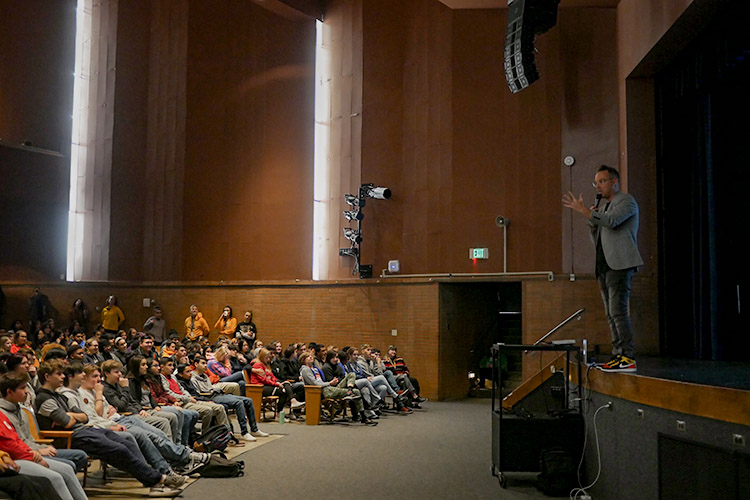
Collin Kartchner speaking on the dangers and pressures of social media in the TJ auditorium. photo by AJ Domagala.
A recent speaker informed the TJ community on the dangers of social media and reminded Spartans to put their phones down.
In February, the Thomas Jefferson community was blessed with a guest speaker who goes by the name Collin Kartchner. He is a social activist determined to raise awareness on the negative effects of smartphones and screen addiction. Kartchner spoke 500 different times in the past year at various colleges, churches, high schools, and everything in between preaching his mission, #SAVETHEKIDS.
Awaiting Kartchner’s speech, I was expecting a lecture on the dangers of social media and cyberbullying; which although it is important, it is a speech that my peers and I have heard millions of times. As the assembly began I realized this wasn’t a speech I was accustomed to hearing and Kartchner wasn’t a standard speaker. He had this fast paced and comedic delivery that instantly made laughter rebound off the auditorium walls and its lofty ceilings. After cracking joke after joke, Kartchner switched the subject matter and his tone. He began to dive into social media’s negative effects on youth’s mental health and how too much screen time is the underlying link to the current epidemic rise in teen depression, anxiety, and suicide. Kartchner read out shocking stories and statements made by children on the effects of social media. Kids as young as ten years old shared the unfortunate outcomes of being on social media and one even said it almost took their life. This terrified me. It opened my eyes to the grasp that social media can have on a kid and can alter their life for the worst.
Kartchner then stated that in order to save the kids from this pandemic we must first save the parents. He compared giving a child a smartphone without any teachings on how to use it or restrictions on the phone is like giving them a car without any practice driving. Expecting kids to navigate the social world of the internet without help is like expecting them to not crash a brand new car without knowing how to drive. Kartchner stated that handing smart phones to kids “steals their joy and robs them of their ability to create and feel real connection.” When kids spend time on platforms such as Instagram, Snapchat, and Tiktok, it ultimately teaches those kids that they will never be enough: not pretty enough or skinny enough. We have created a culture where a teen’s entire self worth is determined by likes and virtual feedback. A change in culture can only be prompted by the parents of these corrupted children.
Kartchner closed his speech by making the TJ audience hug a neighbor for eight seconds to showcase the power of human connection and explain that we don’t get enough of it. As students were leaving the auditorium and heading to class, the long lasting hugs continued. It was clear that Kartchner’s mission had reached the minds of students and faculty at TJ. Spartans were deleting apps and unfollowing accounts that made them unhappy. Junior Alex Trujillo described his choice to delete Tiktok: “The speaker made me realize that I was spending so much useless time on an app that ultimately made me unhappy and made me compare myself to other people.” Kartchner’s speech was a success as it made a lasting impact on the way many students and teachers viewed their phone usage, and let us as a community remember to make connections with those around us rather than those on our telephone screens.
Collin Kartchner speaking on the dangers and pressures of social media in the TJ auditorium. Photo Credit: AJ Domagala.